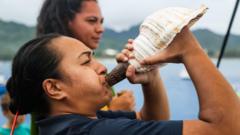As the Cook Islands grapples with the increasing threat of climate change, the government’s push to mine its seabed has ignited a heated debate over the potential environmental impact and economic benefits. Among the treasures lying deep beneath the turquoise waves are polymetallic nodules, rich in essential metals like cobalt, nickel, and manganese. These once-ignored formations could hold the key to a prosperous future, but the stakes are high.
Jean Mason, curator of the Cook Islands Library and Museum, embraces the idea of seabed mining, holding one of these nodules as if it were a precious jewel. “These could reshape our nation,” she asserts, seeing the new industry as a way to bolster local income and withstand the adverse effects of climate change. Although tourism currently accounts for over 70% of the island's economy, rising sea levels threaten this primary source of income.
Governor Mark Brown backs the initiative, envisioning a future where revenues from mining could empower Cook Islanders with education, healthcare, and economic opportunities, allowing them to remain in their homeland. However, the environmental cost looms large. Critics fear that the proposed mining efforts might irreparably harm marine ecosystems. They demand independent studies to be conducted before proceeding.
The seabed, covering a massive 2 million square kilometers under the Cook Islands' exclusive economic zone, presents a tantalizing prospect for companies eager to extract its resources. In 2022, the government issued exploration licenses to three mining companies, initiating research into the impacts of this deep-sea endeavor. Those in favor argue it is less harmful than traditional land mining. Conversely, detractors emphasize the importance of understanding the uncharted effects on marine life.
Increasingly, public sentiment among islanders is rising against the mining project. Through organized gatherings and protests, activists like Alanah Matamaru Smith are vocalizing their concerns over inadequate community consultations regarding the project’s risks. “We need more time to understand the implications,” she states passionately.
While supporters contend that industrialized nations have historically exploited the earth’s resources, local activists argue for a more cautious approach. “You can’t stay neutral when our future is at stake,” says June Hosking, an outspoken critic of the mining plans. As this debate unfolds, the Cook Islands balances hope for economic stability against the need to protect their marine environment—a dilemma that could determine their destiny in a rapidly changing world.
Jean Mason, curator of the Cook Islands Library and Museum, embraces the idea of seabed mining, holding one of these nodules as if it were a precious jewel. “These could reshape our nation,” she asserts, seeing the new industry as a way to bolster local income and withstand the adverse effects of climate change. Although tourism currently accounts for over 70% of the island's economy, rising sea levels threaten this primary source of income.
Governor Mark Brown backs the initiative, envisioning a future where revenues from mining could empower Cook Islanders with education, healthcare, and economic opportunities, allowing them to remain in their homeland. However, the environmental cost looms large. Critics fear that the proposed mining efforts might irreparably harm marine ecosystems. They demand independent studies to be conducted before proceeding.
The seabed, covering a massive 2 million square kilometers under the Cook Islands' exclusive economic zone, presents a tantalizing prospect for companies eager to extract its resources. In 2022, the government issued exploration licenses to three mining companies, initiating research into the impacts of this deep-sea endeavor. Those in favor argue it is less harmful than traditional land mining. Conversely, detractors emphasize the importance of understanding the uncharted effects on marine life.
Increasingly, public sentiment among islanders is rising against the mining project. Through organized gatherings and protests, activists like Alanah Matamaru Smith are vocalizing their concerns over inadequate community consultations regarding the project’s risks. “We need more time to understand the implications,” she states passionately.
While supporters contend that industrialized nations have historically exploited the earth’s resources, local activists argue for a more cautious approach. “You can’t stay neutral when our future is at stake,” says June Hosking, an outspoken critic of the mining plans. As this debate unfolds, the Cook Islands balances hope for economic stability against the need to protect their marine environment—a dilemma that could determine their destiny in a rapidly changing world.




















